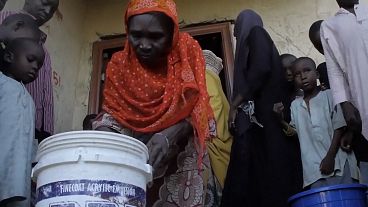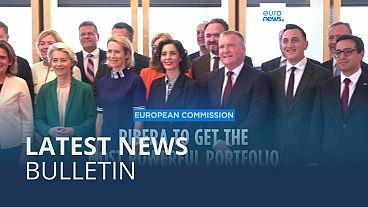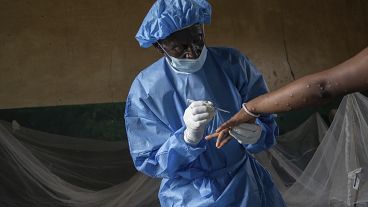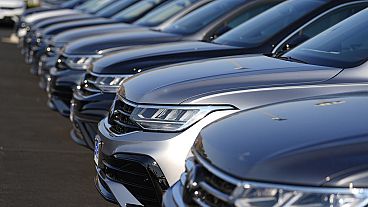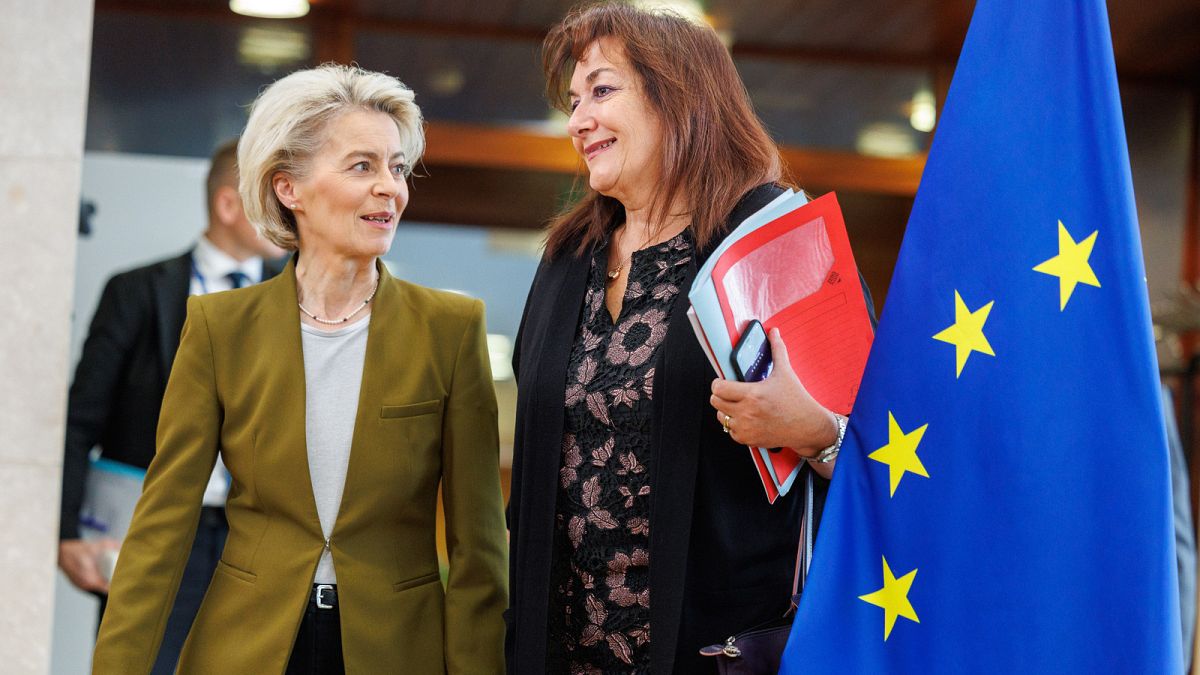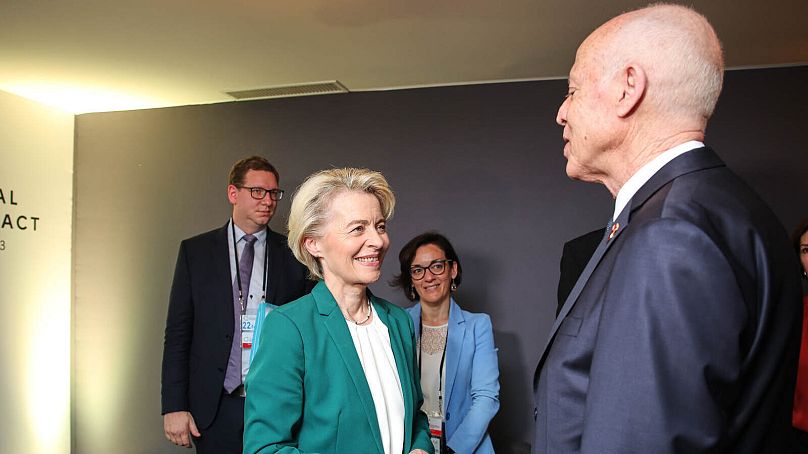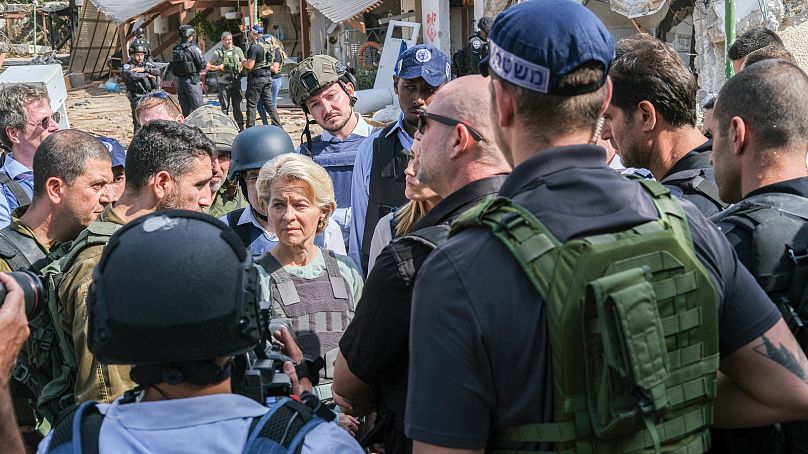The move is a response to the geopolitical urgency of enlargement and the EU's spiralling reputation in its southern neighbourhood.
European Commission President Ursula von der Leyen has formally severed the EU’s policy towards neighbours in North Africa and the Middle East from its approach to aspiring members on its eastern flank, in a move critics say risks perpetuating the EU’s "double standards".
For two decades, the bloc has coordinated its partnerships with neighbouring countries from one executive branch helmed by a single European Commissioner.
But the new team pitched by von der Leyen on Tuesday morning features a Commissioner for enlargement responsible for the eastern neighbourhood, Slovenia’s Marta Kos, and another Commissioner for the Mediterranean with oversight over the southern neighbourhood, Croatia’s Dubravka Šuica.
Von der Leyen has said the split is needed to allow the enlargement chief to fully focus on supporting candidate countries’ integration into the bloc, seen as a geopolitical imperative amid Russia’s aggression in Ukraine.
Commission officials also say it will allow the EU to retake the reins as a credible actor in the Mediterranean.
"It became such a huge portfolio that it turned out we did not have enough footprint on the ground," a senior Commission official, speaking on condition of anonymity, said. "Ten years after the Arab spring, and we are unfortunately back to where we were before."
"At the same time, we stopped a lot of work in the Mediterranean," the official added. "Šuica’s role will be to revitalise those relationships."
The official added that the EU's relationship with Turkey, a Mediterranean and EU candidate country - despite its membership bid being virtually stalled - will straddle both the enlargement and Mediterranean portfolios.
But critics say the move consolidates a recent drift in the EU’s values-based foreign policy.
"When you look at von der Leyen’s mission letters, the values of human rights and democracy - which are at the core of the EU’s foreign policy - are there for candidate countries. But it’s clear that the objectives for cooperation with Mediterranean countries are different," Hussein Baoumi, foreign policy advocacy officer for Amnesty International, told Euronews.
"In the case of the southern neighbourhood, it’s about migration controls, energy cooperation, basically ensuring Mediterranean countries are aligned with the EU’s strategic goals," Baoumi added. "It consolidates the view that the values of democracy and human rights are there for some, but not others."
Šuica - a long-time von der Leyen ally and a member of her centre-right political family - has been tasked with “operationalising the external aspects" of the EU's migration policy, including by striking “comprehensive partnerships” with partners in the region, following the blueprint of recent cash-for-migration-management deals with Tunisia, Egypt, Mauritania and Lebanon.
Under the deals, the bloc injects cash into the countries’ economies in exchange for commitments to clamp down on migrant smuggling networks and drive down the number of migrants embarking on the dangerous journey by boat to the EU’s southern coast.
The deal with Tunisia, struck in July 2023, has contributed to a steep 60% drop in irregular arrivals by boat to Italy in the first eight months of this year compared to the same period last year.
The model is gaining traction and interest among EU member states, especially as the rising popularity of right-wing, anti-migration parties are dragging the migration issue to the heart of national politics.
But human rights defenders have slammed the lack of strings attached to the funding, saying the EU executive is turning a blind eye to partner governments’ documented abuses against migrant communities, such as in the case of Tunisia.
EU investment programmes in candidate countries, such as the Western Balkans, are meanwhile dependent on those countries implementing a string of reforms linked to strengthening democracy and good governance.
Šuica to pen Gaza strategy and EU reputation plan
Pending a parliamentary hearing and vote, Šuica will also be tasked with penning a new "EU Middle East Strategy with a view to the day after the war in Gaza," in collaboration with the designated top diplomat, Kaja Kallas.
Several sources with knowledge of power tussles within the executive have told Euronews there is concern von der Leyen is aiming to tighten her own grip on the bloc's policy towards the Middle East after top diplomat Josep Borrell's departure, and that the designation of Šuica, her loyal ally, as the Mediterranean Commissioner will allow her to do that.
Borrell is considered to have pushed the boundaries of his mandate to exert diplomatic pressure on Israel to comply with its international obligations in the war in Gaza.
Von der Leyen, along with outgoing neighbourhood enlargement, Hungary's Olivér Várhelyi, have been fiercely criticised for what many judge to be a firmly pro-Israeli stance.
Šuica will now inherit Várhelyi's command over EU funding to the Palestinian Authority, which according to von der Leyen's mission letter will be "anchored in reforms", helping "pave the way for a two-state solution". She has also been tasked with working together with the international community on a reconstruction plan for Gaza.
Also among von der Leyen's requests is a "strategic communication plan" designed to promote the EU's role in its southern neighbourhood and "counter anti-EU narratives."
The EU's reputation in the Middle East and the broader Global South is considered to have spiralled further since the war in Gaza erupted with Hamas' attack on Israel almost a year ago.
Von der Leyen was fiercely criticised for her hesitancy to speak up about the death toll in Gaza - which currently stands at over 41,000 - and her failure to take retaliatory action when Commissioner Várhelyi unilaterally announced that "all payments" to the Palestinians would be immediately suspended in response to Hamas' attacks.
"The Commission is clearly aware of rising anti-EU sentiment in the region and a rapprochement towards certain countries that are considered the EU's geopolitical competitors, such as China, Russia," Baoumi of Amnesty International said.
"It reveals a dissonance," he added. "You can't have strategic communications to convince that the EU is a friend as long as the EU is still supporting governments that are suppressing them or coastguards that are letting people die at sea."

